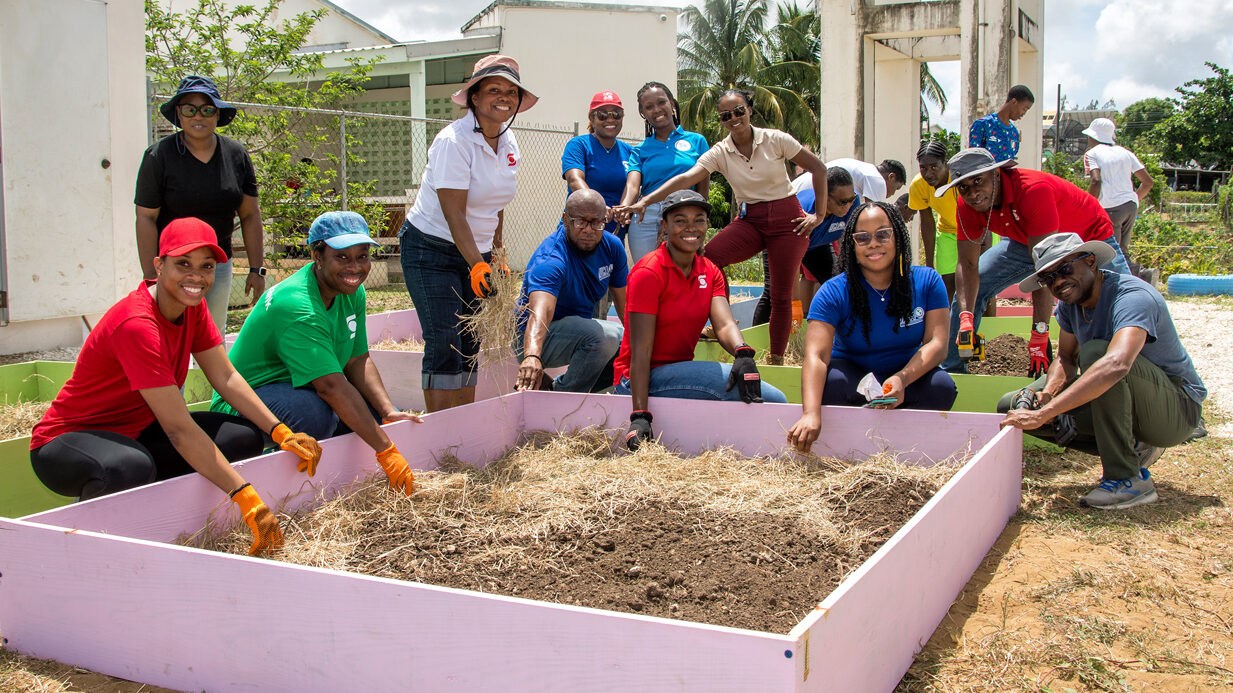Scotiabank Donation Empowers Students in Climate-Smart Agricultural Training Project

June 29, 2024
Students from Derrick Smith School, Challenor Creative Arts & Training Centre, and The Ann Hill School receive support in climate-smart agriculture through Scotiabank's $47,500 donation. The Farm-Able project empowers youth with disabilities in sustainable agriculture and entrepreneurship.
Students from the Derrick Smith School & Vocational Centre, Challenor Creative Arts & Training Centre, and The Ann Hill School are receiving another year of support in climate-smart and adaptive agricultural training thanks to a $47 500 donation from Scotiabank (Barbados) Limited.
The Farm-Able Livelihoods Project for Persons with Disabilities, in collaboration with the Barbados Environmental Conservation Trust (BECT) and the Institute for Cooperation on Agriculture (IICA), will continue from its first year of preliminary training in sustainable agriculture systems, to empower and strengthen the capacity of young persons with disabilities to grow and rear their own food.
Farm-Able, now entering its second year, will continue to reinforce sustainable and resilient agricultural techniques. Building on the success of the first year, Phase II of the project will also concentrate on strengthening students’ capacity in agri-entrepreneurship.
The Farm-Able project addresses multiple critical needs in youth and agriculture, providing valuable skills to youth within the vulnerable community, fostering entrepreneurship, and enhancing household food security.
Scotiabank (Barbados) Limited’s Managing Director, Suzette Armoogam-Shah underscored the importance of the project and the Bank’s commitment to youth, stating, “Providing opportunities for full and equal social and economic participation is beneficial not only to youth with disabilities, but also their surrounding societies, allowing them to contribute fully to the country’s development and economic growth to the fullest extent of their abilities. This initiative teaches our youth about agriculture and allows them to explore agri-preneurship as means of employability and viable income.”
Supporting partners at the BECT – a registered charity supporting local initiatives aimed at environmental sustainability since 2019 – are continually working towards the mainstreaming of sustainable agricultural practices, stronger farm-to-table connections and public education for sustainable agriculture with its partners.
For a second year, the Trust is supporting the Farm-Able initiative which has been a key project in driving new learnings and opportunities for young persons in the community of persons with disabilities.
BECT Executive Director Ché Greenidge, reflected on the significance of Scotiabank’s contribution and continued partnership.
“Initiatives like Farm-Able are crucial for BECT, whereby food insecurity remains a pressing issue for our country. Scotiabank’s commitment as a corporate partner for a second year highlights the critical role that the private sector plays in not only nurturing and empowering our youth, but the development of the agricultural sector overall,” she said.
“The environmental field needs more support from corporate Barbados if we are truly to attain the sustainable development goals, and climate resilience. BECT commends Scotiabank for its leadership and dedication to sustainability and community development.”
Implementing partner, IICA will continue to facilitate enhanced learning and technical skills in food production systems, including aquaponics, poultry farming, and rabbit rearing across Farm-Able’s participating learning centres. IICA will also leverage its expertise and networks in agribusiness to provide access to resources and mentor the young participants in developing their agribusiness skills.
“I would love to see this programme contribute to having all persons contribute to food security in Barbados”, shared IICA Representative in Barbados, Allister Glean.
Through this initiative, he envisions, “everybody contributing to food production and persons who are differently abled being able to see farming [and] to see agricultural activities as a potential revenue earner and life-changing activity.”
(PR)


